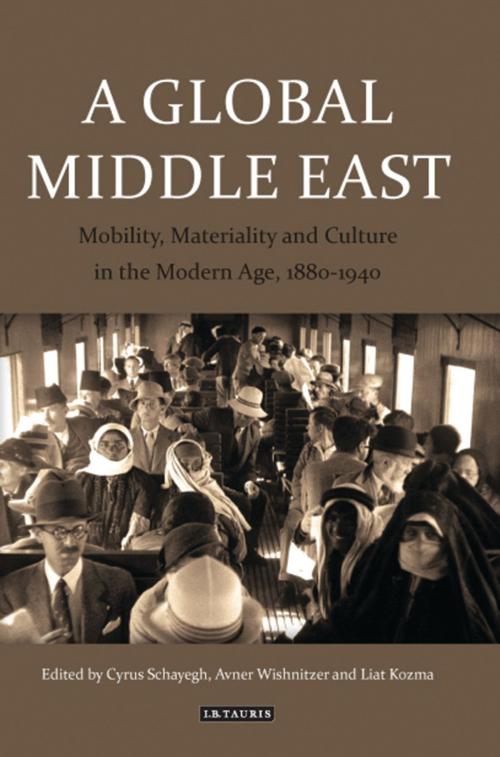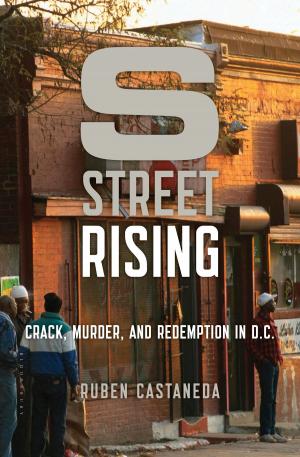A Global Middle East
Mobility, Materiality and Culture in the Modern Age, 1880-1940
Nonfiction, Science & Nature, Science, Social & Cultural Studies, Social Science, History| Author: | ISBN: | 9780857738578 | |
| Publisher: | Bloomsbury Publishing | Publication: | December 3, 2014 |
| Imprint: | I.B. Tauris | Language: | English |
| Author: | |
| ISBN: | 9780857738578 |
| Publisher: | Bloomsbury Publishing |
| Publication: | December 3, 2014 |
| Imprint: | I.B. Tauris |
| Language: | English |
The start of the twentieth century ushered in a period of unprecedented change in the Middle East. These transformations, brought about by the emergence of the modern state system and an increasing interaction with a more globalized economy, irrevocably altered the political and social structures of the Middle East, even as the region itself left its mark on the processes of globalization themselves. As a result of these changes, there was an intensification in the movement of people, commodities and ideas across the globe: commercial activity, urban space, intellectual life, leisure culture, immigration patterns and education – nothing was left untouched. It shows how even as the Middle East was responding to increased economic interactions with the rest of the world by restructuring not only local economies, but also cultural, political and social institutions, the region's engagement with these trends altered the nature of globalization itself.
This period has been seen as one in which the modern state system and its oftentimes artificial boundaries emerged in the Middle East. But this book highlights how, despite this, it was also one of tremendous interconnection. Approaching the first period of modern globalization by investigating the movement of people, objects and ideas into, around and out of the Middle East, the authors demonstrate how the Middle East in this period was not simply subject or reactive to the West, but rather an active participant in the transnational flows that transformed both the region and the world.
A Global Middle East offers an examination of a variety of intellectual and more material exchanges, such as nascent feminist movements and Islamist ideologies as well as the movement of sex workers across the Mediterranean and Jewish migration into Palestine. A Global Middle East emphasises this by examining the multi-directional nature of movement across borders, as well as this movement's intensity, volume and speed. By focusing on the theme of mobility as the defining feature of 'modern globalization' in the Middle East, it provides an essential examination of the formative years of the region.
The start of the twentieth century ushered in a period of unprecedented change in the Middle East. These transformations, brought about by the emergence of the modern state system and an increasing interaction with a more globalized economy, irrevocably altered the political and social structures of the Middle East, even as the region itself left its mark on the processes of globalization themselves. As a result of these changes, there was an intensification in the movement of people, commodities and ideas across the globe: commercial activity, urban space, intellectual life, leisure culture, immigration patterns and education – nothing was left untouched. It shows how even as the Middle East was responding to increased economic interactions with the rest of the world by restructuring not only local economies, but also cultural, political and social institutions, the region's engagement with these trends altered the nature of globalization itself.
This period has been seen as one in which the modern state system and its oftentimes artificial boundaries emerged in the Middle East. But this book highlights how, despite this, it was also one of tremendous interconnection. Approaching the first period of modern globalization by investigating the movement of people, objects and ideas into, around and out of the Middle East, the authors demonstrate how the Middle East in this period was not simply subject or reactive to the West, but rather an active participant in the transnational flows that transformed both the region and the world.
A Global Middle East offers an examination of a variety of intellectual and more material exchanges, such as nascent feminist movements and Islamist ideologies as well as the movement of sex workers across the Mediterranean and Jewish migration into Palestine. A Global Middle East emphasises this by examining the multi-directional nature of movement across borders, as well as this movement's intensity, volume and speed. By focusing on the theme of mobility as the defining feature of 'modern globalization' in the Middle East, it provides an essential examination of the formative years of the region.















